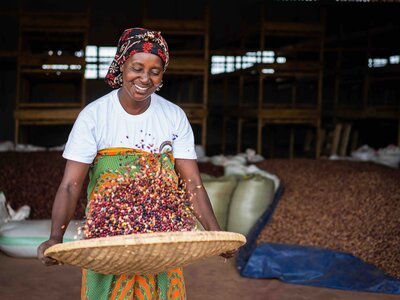Rwanda
- 69.6 years
- life expectancy
- 32.4%
- of children under 5 suffer from chronic malnutrition
- 13.2 million
- population
Rwanda is one of the most densely populated countries in Africa, growing at 2.3 percent annually. In the past two decades, the Government has recorded significant achievements in poverty reduction, gender equality, environmental sustainability, education and public health, in line with the Sustainable Development Goals.
The country’s economy remains largely dependent on agriculture, with 69 percent of rural households involved in small-scale farming on small plots of land. Irregular rainfall, drought, floods, pests and diseases, together with intense competition for agricultural land, continue to affect food security.
Over 38 percent of Rwanda’s population lives in poverty, and nearly one fifth is food insecure. Nearly a third of children under 5 have chronic malnutrition.
The World Food Programme (WFP) provides food and nutrition assistance to refugees and supports the implementation of national priorities for achieving zero hunger and sustainable development. WFP also works with the Government to make the latter’s social protection system more inclusive and shock responsive, in line with Rwanda’s national planning processes and development programmes.
What the World Food Programme is doing in Rwanda
-
Food assistance to refugees and returnees
-
WFP provides cash-based transfers to nearly 120,000 refugees in five camps, and an average of 150 Rwandan returnees per month, so they can buy food of their choice. Around 6,600 asylum seekers receive food assistance until their registration and allocation to individual shelters. We provide school meals for children, including those from host communities around the camps, to support their education and health. When disasters strike, we provide people with immediate food and nutrition assistance. Rwandan refugees returning home are also supported, to help them re-integrate into their communities.
-
Resilience building for climate-related shocks and social protection
-
Home-grown school feeding
-
Improving nutrition
-
Food systems transformation
-
Emergency preparedness and response
Rwanda news releases
Go to pagePartners and Donors
Find out more about the state of food security in Rwanda
Visit the food security analysis pageOperations in Rwanda
Contacts
Office
SONARWA Compound, Ex-TRAFIPRO Kicukiro P.O. Box 1150 Kigali, Rwanda
Kigali
Rwanda







